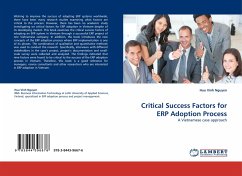High demand has led companies to grow exponentially and, with the increase in the number of competitors and the unbridled search for better price and quality conditions, the automation of processes has become mandatory within organizations. In this context, MRPs systems emerged, programs that carried out basic stock control activities, giving way to tasks that had previously been done manually, resulting in slowness and a large number of errors in order management processes. From these, MRPs evolved into systems called MRPII, where they made it possible to plan and control activities from the sales process to the delivery of material. From there, with the integration of other departments into this system, ERP was developed. ERPs are large systems that integrate all areas of the organization into a single data repository, helping to speed up processes, since they make it possible to extract data in real time, enabling decisions to be made. However, implementing an ERP requires a number of resources which, if not planned properly, can lead to a number of factors such as those mentioned in this book.
Bitte wählen Sie Ihr Anliegen aus.
Rechnungen
Retourenschein anfordern
Bestellstatus
Storno








